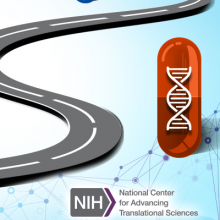Platform Vector Gene Therapy (PaVe-GT) Pilot Project
Through the PaVe-GT Pilot project, we try to make gene therapy development and clinical testing more efficient and available to many people with rare diseases.
About the PaVe-GT Pilot Project
Contact
Project Team Members
The PaVe-GT team is composed of experts from multiple institutes and centers to work together as a team.
New technologies — including using viruses to move properly working genes to cells that need them — are making gene therapy more appealing to people with rare genetic diseases. Yet, due to the high costs of therapy development and low return on investment, many companies may not want to spend the time and money it takes to develop, test and bring to market gene therapy for a very rare disease.
NCATS, along with NIH’s National Human Genome Research Institute and National Institute of Neurological Disorders and Stroke, began the PaVe-GT pilot project in 2019 to test the hypothesis of whether a platform vector approach will increase efficiency in preclinical testing and clinical trial start-up.
The goal of the PaVe-GT project is to test the outcome of using the same gene delivery system and manufacturing methods in several rare disease gene therapy clinical trials. More specifically, PaVe-GT researchers are using a common gene delivery vehicle, adeno-associated virus (AAV), to create gene therapies for four rare genetic diseases. Each disease is being currently studied at the NIH Clinical Center. They include two inherited muscle weakness/neuromuscular junction disorders (Dok7 deficiency and Collagen Q deficiency) and two inherited metabolic diseases (propionic acidemia and isolated methylmalonic acidemia).
By including many diseases at a time, the PaVe-GT team is working to improve the efficiency of the clinical trial startup process for gene therapy and develop a standardized “blueprint” for similar gene therapy projects focused on rare diseases. To allow others to benefit and learn from the process taken in PaVe-GT, the team publicly shares the scientific and regulatory experience while applying this approach. This includes lessons learned from preclinical toxicology and biodistribution studies, manufacturing processes and regulatory documentation, including Investigational New Drug filings, communications with the U.S. Food and Drug Administration (FDA) and other proprietary documents, on the PaVe-GT website.
PaVe-GT News

NIH Gene Therapy Team Reveals Its Path to FDA Orphan Drug and Rare Pediatric Disease Designations
March 29, 2023 - NCATS News
- Our Impact on Rare Diseases
- Our Impact on Research Operations
- Platform Vector Gene Therapy (PaVe-GT)
When NCATS received an Orphan Drug Designation (ODD) from the U.S. Food and Drug Administration (FDA), it marked a key accomplishment for researchers in the NIH's Platform Vector Gene Therapy (PaVe-GT) project.
Read ArticlePropelling Cures With Genetics Research: Interview With Joni L. Rutter, PhD, Director of the National Center for Advancing Translational Sciences at NIH
December 14, 2023 - Grantee/Partner News
- 3-D Tissue Bioprinting
- Bespoke Gene Therapy Consortium (BGTC)
- Clinical and Translational Science Awards (CTSA) Program
- New Therapeutic Uses (NTU)
- Platform Vector Gene Therapy (PaVe-GT)
- Rare Diseases Clinical Research Network (RDCRN)
- Somatic Cell Genome Editing (SCGE)
- Therapeutics for Rare and Neglected Diseases (TRND)
- Tissue Chip for Drug Screening
NIH Gene Therapy Team Reveals Its Path to FDA Orphan Drug and Rare Pediatric Disease Designations
March 29, 2023 - NCATS News
- Our Impact on Rare Diseases
- Our Impact on Research Operations
- Platform Vector Gene Therapy (PaVe-GT)
When NCATS received an Orphan Drug Designation (ODD) from the U.S.
Developers of Gene Therapies Can Utilize FDA Guidance to Prepare ODD or RPDD Applications
March 27, 2023 - Media Coverage
- Platform Vector Gene Therapy (PaVe-GT)
Meet the Investigators
Watch this video (video length: 6:42) to meet the investigators behind PaVe-GT. A version of this video with audio description is available.
Related Research

Bespoke Gene Therapy Consortium
The Accelerating Medicines Partnership® (AMP®) program focuses on developing platforms and standards to speed the development and delivery of gene therapies for rare diseases.

Somatic Cell Genome Editing
This NIH Common Fund program aims to create and make available high-quality tools for safe and effective genome editing in people.

Genetic and Rare Diseases Information Center
GARD is a resource that offers current and reliable health information on a wide range of rare and genetic diseases.



